Ethical Implications of Wikileaks and DNC Email Leak: A Case Study
VerifiedAdded on 2022/10/02
|12
|3401
|19
Case Study
AI Summary
This case study examines the ethical issues surrounding the 2016 Wikileaks email leak involving the Democratic National Committee (DNC). It begins with a factual overview of the incident, detailing the theft and publication of DNC emails by hackers, allegedly linked to Russian intelligence agencies, and the subsequent impact on the Democratic National Convention. The study then applies Kant's ethical theories and the concept of categorical imperative to analyze the actions of Wikileaks and the hackers, exploring the ethical dilemma of publishing the emails. The Blanchard and Peale method is utilized to resolve the ethical issues, focusing on legalities, dilemmas, and personal comfort with the decisions. The study also includes a personal ethical philosophy to provide a framework for ethical choices, and how this philosophy relates to the Wikileaks case. The paper concludes with a discussion of the ethical implications and the breach of trust involved.
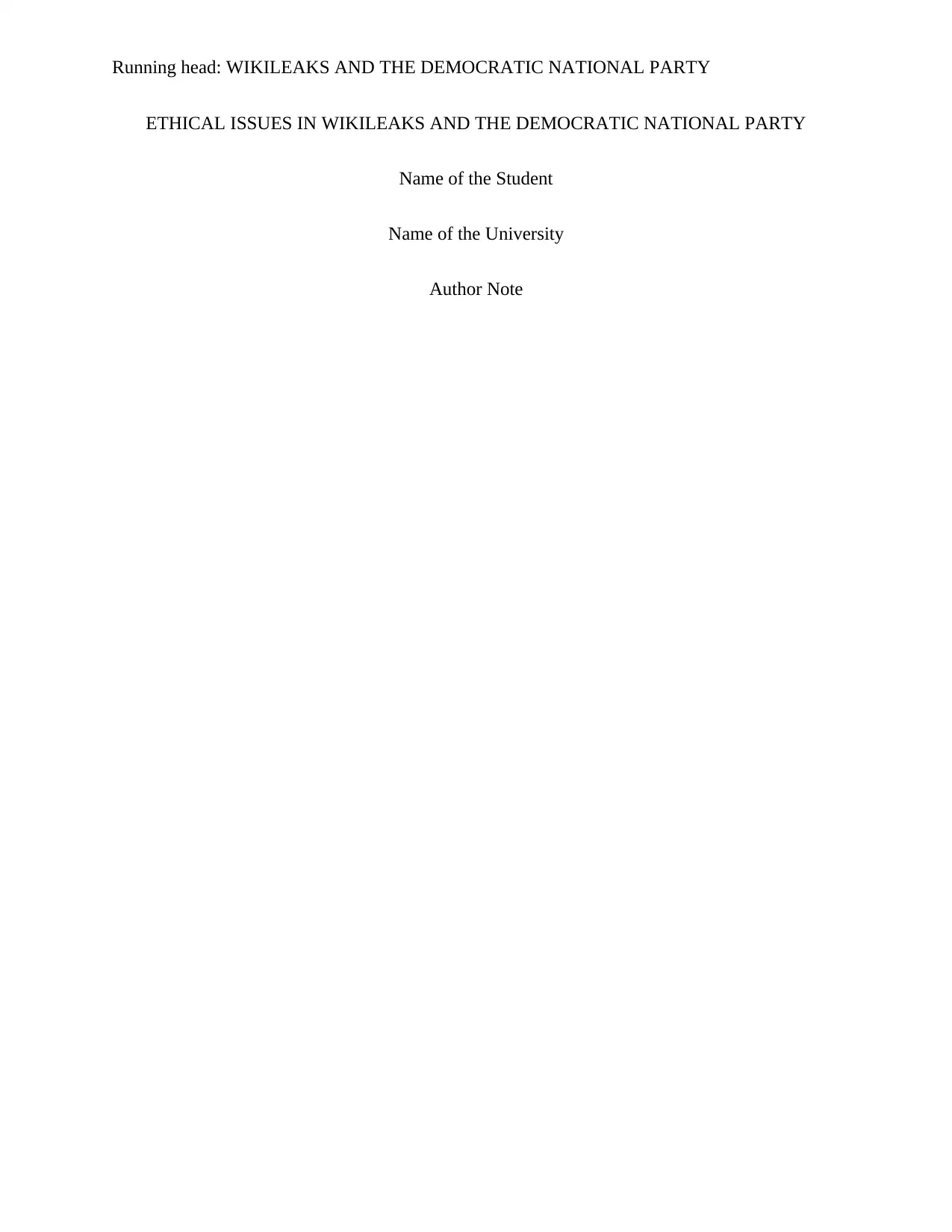
Running head: WIKILEAKS AND THE DEMOCRATIC NATIONAL PARTY
ETHICAL ISSUES IN WIKILEAKS AND THE DEMOCRATIC NATIONAL PARTY
Name of the Student
Name of the University
Author Note
ETHICAL ISSUES IN WIKILEAKS AND THE DEMOCRATIC NATIONAL PARTY
Name of the Student
Name of the University
Author Note
Paraphrase This Document
Need a fresh take? Get an instant paraphrase of this document with our AI Paraphraser
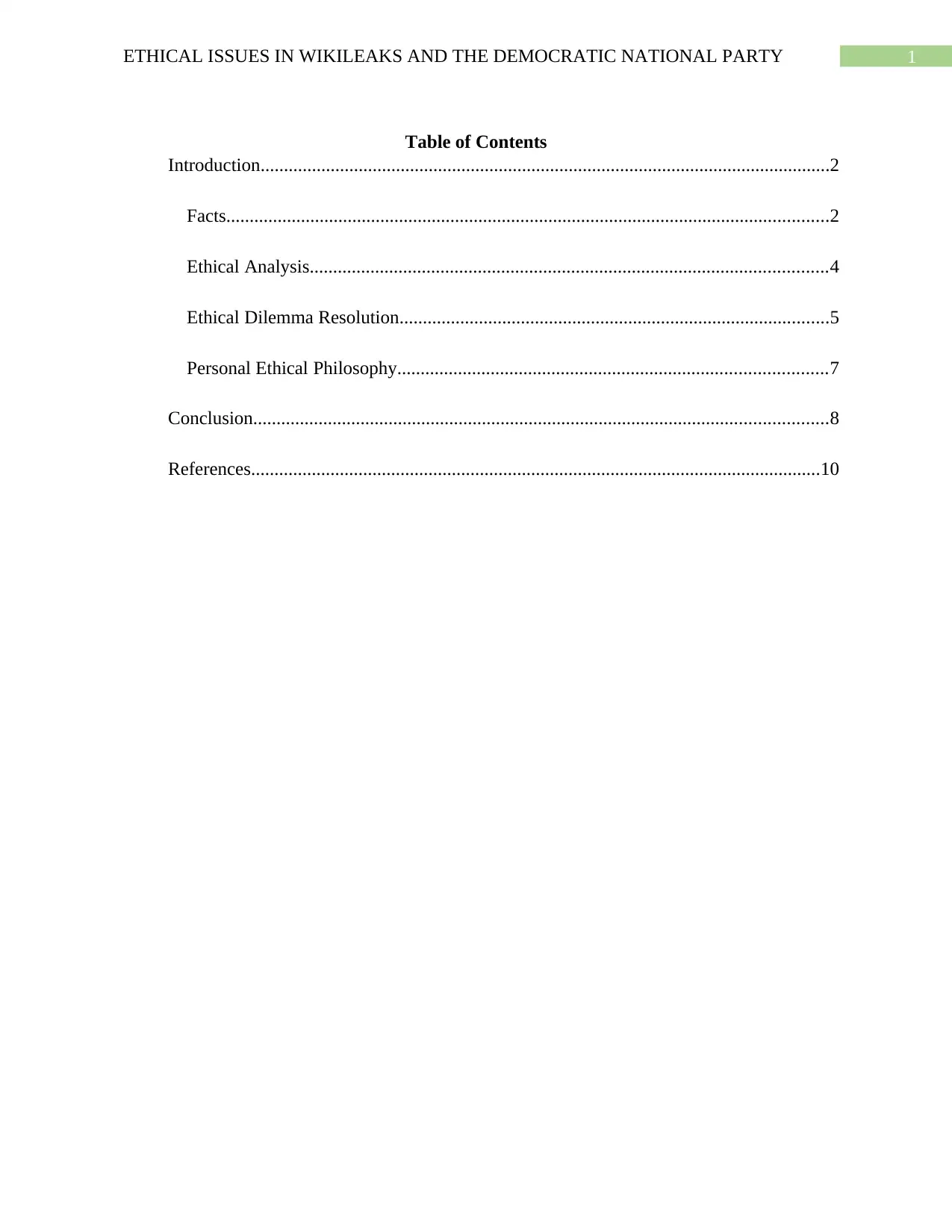
1ETHICAL ISSUES IN WIKILEAKS AND THE DEMOCRATIC NATIONAL PARTY
Table of Contents
Introduction..........................................................................................................................2
Facts.................................................................................................................................2
Ethical Analysis...............................................................................................................4
Ethical Dilemma Resolution............................................................................................5
Personal Ethical Philosophy............................................................................................7
Conclusion...........................................................................................................................8
References..........................................................................................................................10
Table of Contents
Introduction..........................................................................................................................2
Facts.................................................................................................................................2
Ethical Analysis...............................................................................................................4
Ethical Dilemma Resolution............................................................................................5
Personal Ethical Philosophy............................................................................................7
Conclusion...........................................................................................................................8
References..........................................................................................................................10
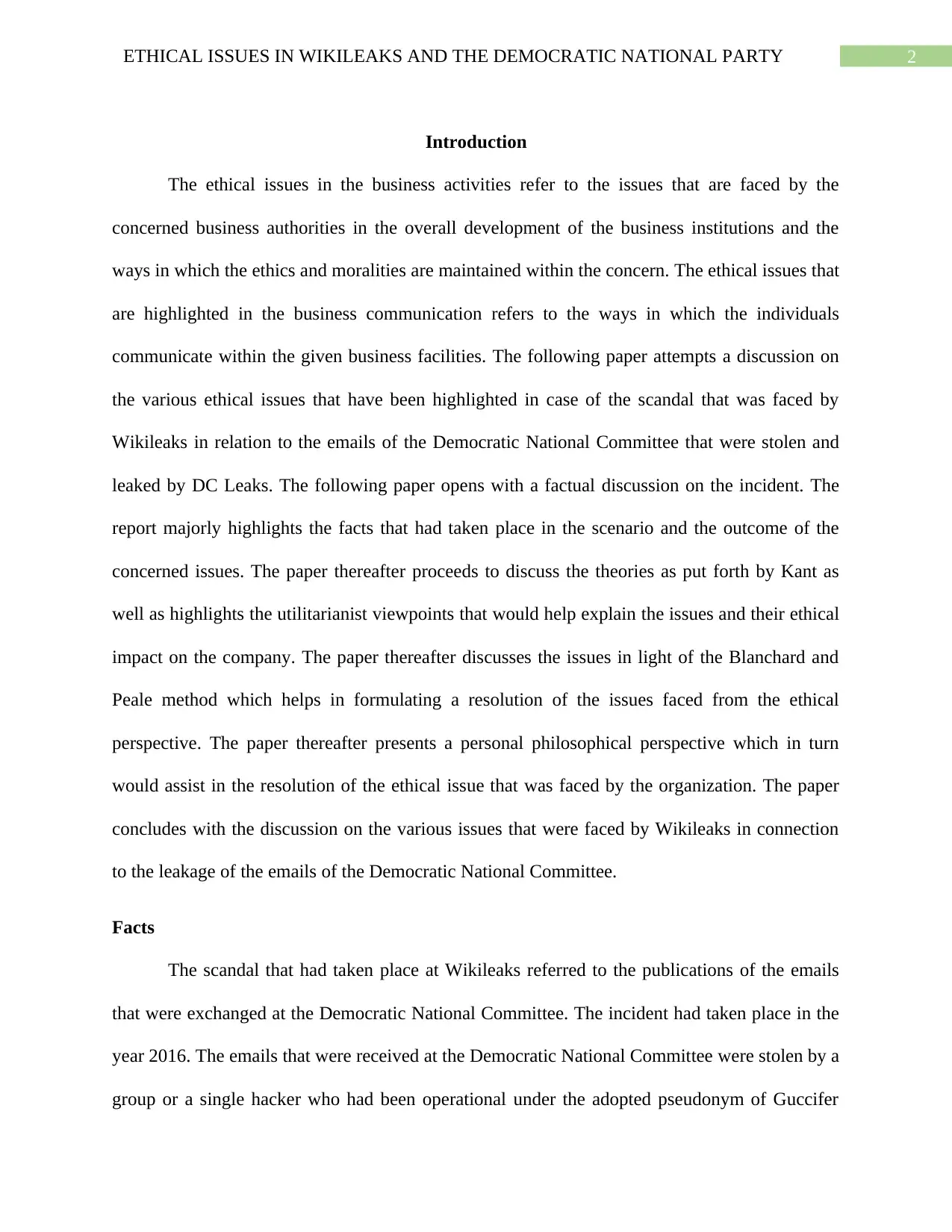
2ETHICAL ISSUES IN WIKILEAKS AND THE DEMOCRATIC NATIONAL PARTY
Introduction
The ethical issues in the business activities refer to the issues that are faced by the
concerned business authorities in the overall development of the business institutions and the
ways in which the ethics and moralities are maintained within the concern. The ethical issues that
are highlighted in the business communication refers to the ways in which the individuals
communicate within the given business facilities. The following paper attempts a discussion on
the various ethical issues that have been highlighted in case of the scandal that was faced by
Wikileaks in relation to the emails of the Democratic National Committee that were stolen and
leaked by DC Leaks. The following paper opens with a factual discussion on the incident. The
report majorly highlights the facts that had taken place in the scenario and the outcome of the
concerned issues. The paper thereafter proceeds to discuss the theories as put forth by Kant as
well as highlights the utilitarianist viewpoints that would help explain the issues and their ethical
impact on the company. The paper thereafter discusses the issues in light of the Blanchard and
Peale method which helps in formulating a resolution of the issues faced from the ethical
perspective. The paper thereafter presents a personal philosophical perspective which in turn
would assist in the resolution of the ethical issue that was faced by the organization. The paper
concludes with the discussion on the various issues that were faced by Wikileaks in connection
to the leakage of the emails of the Democratic National Committee.
Facts
The scandal that had taken place at Wikileaks referred to the publications of the emails
that were exchanged at the Democratic National Committee. The incident had taken place in the
year 2016. The emails that were received at the Democratic National Committee were stolen by a
group or a single hacker who had been operational under the adopted pseudonym of Guccifer
Introduction
The ethical issues in the business activities refer to the issues that are faced by the
concerned business authorities in the overall development of the business institutions and the
ways in which the ethics and moralities are maintained within the concern. The ethical issues that
are highlighted in the business communication refers to the ways in which the individuals
communicate within the given business facilities. The following paper attempts a discussion on
the various ethical issues that have been highlighted in case of the scandal that was faced by
Wikileaks in relation to the emails of the Democratic National Committee that were stolen and
leaked by DC Leaks. The following paper opens with a factual discussion on the incident. The
report majorly highlights the facts that had taken place in the scenario and the outcome of the
concerned issues. The paper thereafter proceeds to discuss the theories as put forth by Kant as
well as highlights the utilitarianist viewpoints that would help explain the issues and their ethical
impact on the company. The paper thereafter discusses the issues in light of the Blanchard and
Peale method which helps in formulating a resolution of the issues faced from the ethical
perspective. The paper thereafter presents a personal philosophical perspective which in turn
would assist in the resolution of the ethical issue that was faced by the organization. The paper
concludes with the discussion on the various issues that were faced by Wikileaks in connection
to the leakage of the emails of the Democratic National Committee.
Facts
The scandal that had taken place at Wikileaks referred to the publications of the emails
that were exchanged at the Democratic National Committee. The incident had taken place in the
year 2016. The emails that were received at the Democratic National Committee were stolen by a
group or a single hacker who had been operational under the adopted pseudonym of Guccifer
⊘ This is a preview!⊘
Do you want full access?
Subscribe today to unlock all pages.

Trusted by 1+ million students worldwide
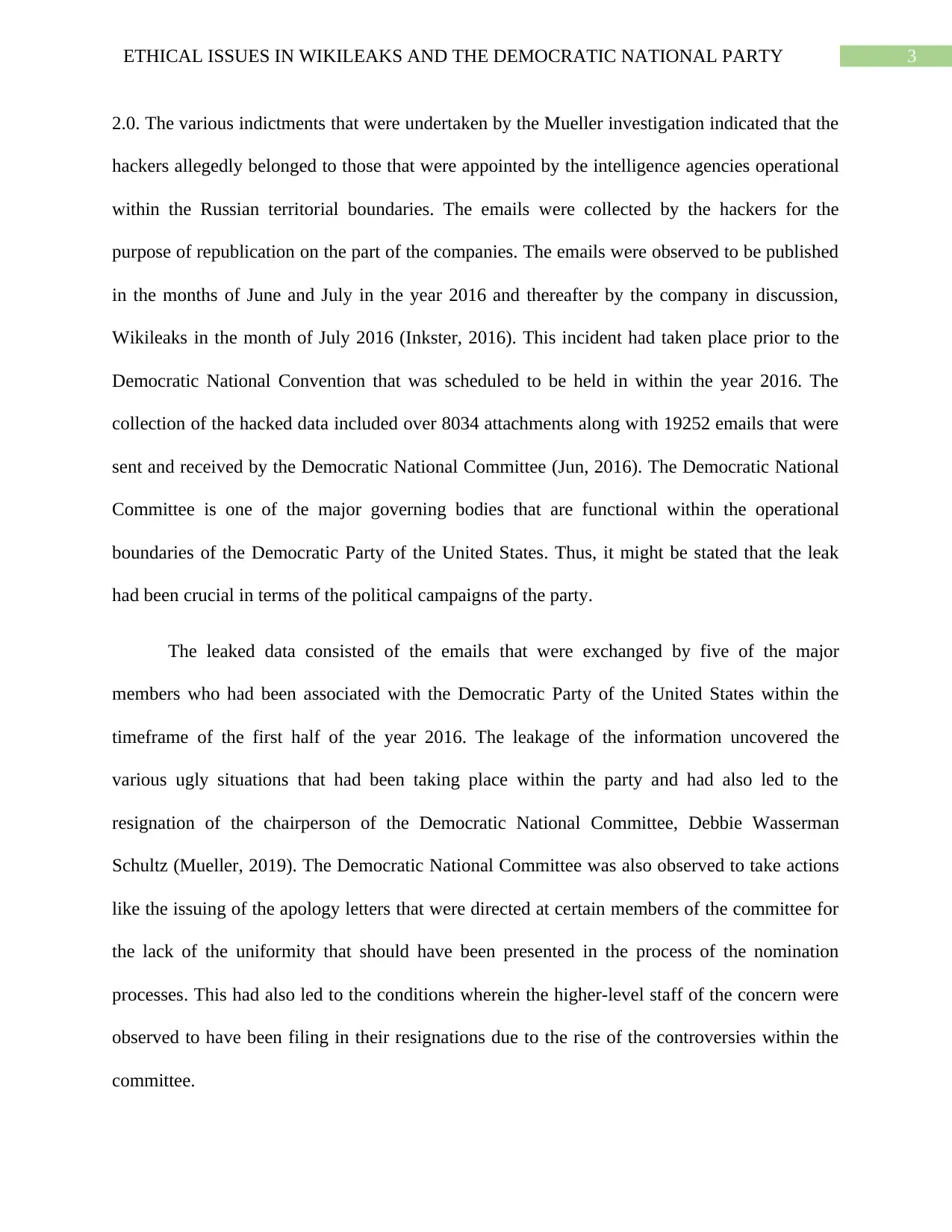
3ETHICAL ISSUES IN WIKILEAKS AND THE DEMOCRATIC NATIONAL PARTY
2.0. The various indictments that were undertaken by the Mueller investigation indicated that the
hackers allegedly belonged to those that were appointed by the intelligence agencies operational
within the Russian territorial boundaries. The emails were collected by the hackers for the
purpose of republication on the part of the companies. The emails were observed to be published
in the months of June and July in the year 2016 and thereafter by the company in discussion,
Wikileaks in the month of July 2016 (Inkster, 2016). This incident had taken place prior to the
Democratic National Convention that was scheduled to be held in within the year 2016. The
collection of the hacked data included over 8034 attachments along with 19252 emails that were
sent and received by the Democratic National Committee (Jun, 2016). The Democratic National
Committee is one of the major governing bodies that are functional within the operational
boundaries of the Democratic Party of the United States. Thus, it might be stated that the leak
had been crucial in terms of the political campaigns of the party.
The leaked data consisted of the emails that were exchanged by five of the major
members who had been associated with the Democratic Party of the United States within the
timeframe of the first half of the year 2016. The leakage of the information uncovered the
various ugly situations that had been taking place within the party and had also led to the
resignation of the chairperson of the Democratic National Committee, Debbie Wasserman
Schultz (Mueller, 2019). The Democratic National Committee was also observed to take actions
like the issuing of the apology letters that were directed at certain members of the committee for
the lack of the uniformity that should have been presented in the process of the nomination
processes. This had also led to the conditions wherein the higher-level staff of the concern were
observed to have been filing in their resignations due to the rise of the controversies within the
committee.
2.0. The various indictments that were undertaken by the Mueller investigation indicated that the
hackers allegedly belonged to those that were appointed by the intelligence agencies operational
within the Russian territorial boundaries. The emails were collected by the hackers for the
purpose of republication on the part of the companies. The emails were observed to be published
in the months of June and July in the year 2016 and thereafter by the company in discussion,
Wikileaks in the month of July 2016 (Inkster, 2016). This incident had taken place prior to the
Democratic National Convention that was scheduled to be held in within the year 2016. The
collection of the hacked data included over 8034 attachments along with 19252 emails that were
sent and received by the Democratic National Committee (Jun, 2016). The Democratic National
Committee is one of the major governing bodies that are functional within the operational
boundaries of the Democratic Party of the United States. Thus, it might be stated that the leak
had been crucial in terms of the political campaigns of the party.
The leaked data consisted of the emails that were exchanged by five of the major
members who had been associated with the Democratic Party of the United States within the
timeframe of the first half of the year 2016. The leakage of the information uncovered the
various ugly situations that had been taking place within the party and had also led to the
resignation of the chairperson of the Democratic National Committee, Debbie Wasserman
Schultz (Mueller, 2019). The Democratic National Committee was also observed to take actions
like the issuing of the apology letters that were directed at certain members of the committee for
the lack of the uniformity that should have been presented in the process of the nomination
processes. This had also led to the conditions wherein the higher-level staff of the concern were
observed to have been filing in their resignations due to the rise of the controversies within the
committee.
Paraphrase This Document
Need a fresh take? Get an instant paraphrase of this document with our AI Paraphraser
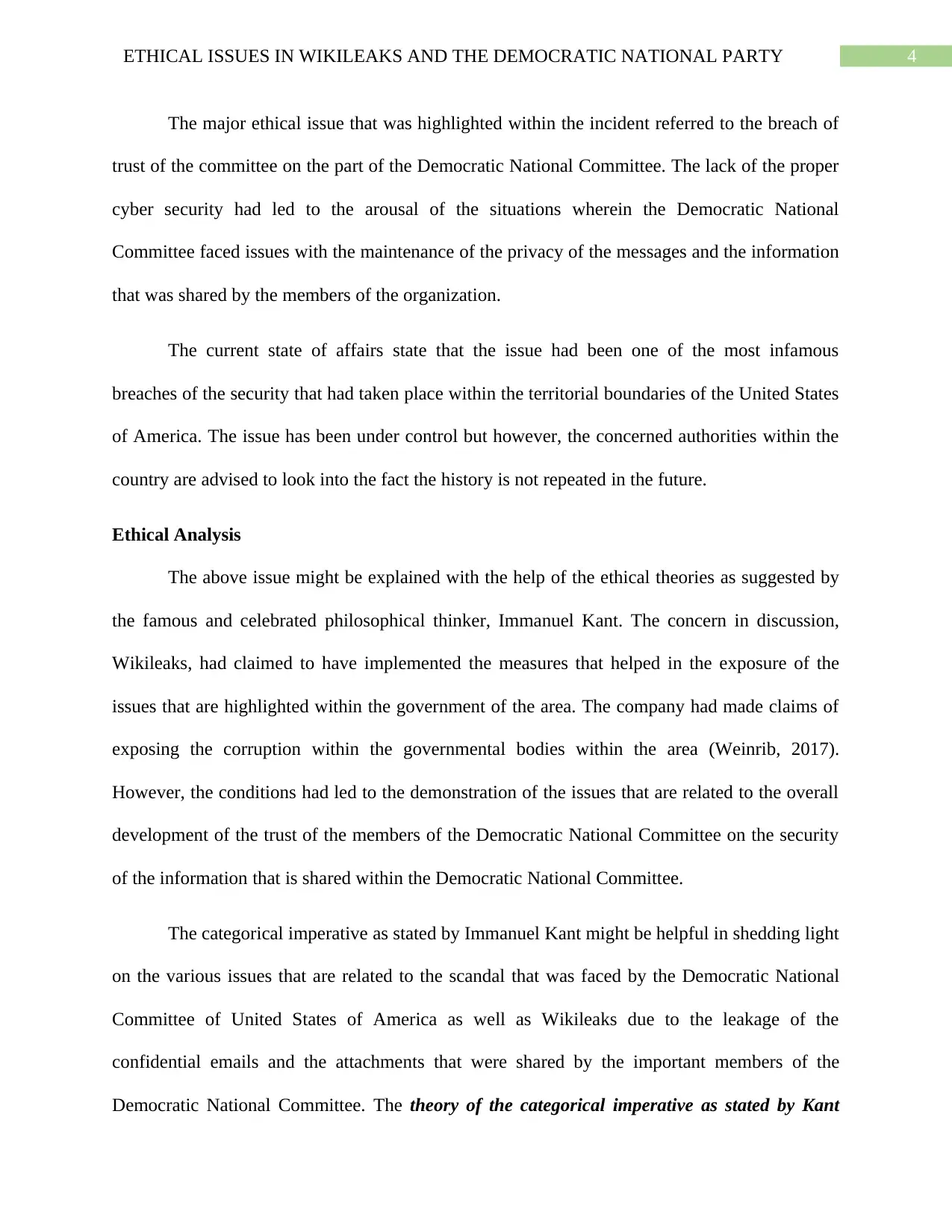
4ETHICAL ISSUES IN WIKILEAKS AND THE DEMOCRATIC NATIONAL PARTY
The major ethical issue that was highlighted within the incident referred to the breach of
trust of the committee on the part of the Democratic National Committee. The lack of the proper
cyber security had led to the arousal of the situations wherein the Democratic National
Committee faced issues with the maintenance of the privacy of the messages and the information
that was shared by the members of the organization.
The current state of affairs state that the issue had been one of the most infamous
breaches of the security that had taken place within the territorial boundaries of the United States
of America. The issue has been under control but however, the concerned authorities within the
country are advised to look into the fact the history is not repeated in the future.
Ethical Analysis
The above issue might be explained with the help of the ethical theories as suggested by
the famous and celebrated philosophical thinker, Immanuel Kant. The concern in discussion,
Wikileaks, had claimed to have implemented the measures that helped in the exposure of the
issues that are highlighted within the government of the area. The company had made claims of
exposing the corruption within the governmental bodies within the area (Weinrib, 2017).
However, the conditions had led to the demonstration of the issues that are related to the overall
development of the trust of the members of the Democratic National Committee on the security
of the information that is shared within the Democratic National Committee.
The categorical imperative as stated by Immanuel Kant might be helpful in shedding light
on the various issues that are related to the scandal that was faced by the Democratic National
Committee of United States of America as well as Wikileaks due to the leakage of the
confidential emails and the attachments that were shared by the important members of the
Democratic National Committee. The theory of the categorical imperative as stated by Kant
The major ethical issue that was highlighted within the incident referred to the breach of
trust of the committee on the part of the Democratic National Committee. The lack of the proper
cyber security had led to the arousal of the situations wherein the Democratic National
Committee faced issues with the maintenance of the privacy of the messages and the information
that was shared by the members of the organization.
The current state of affairs state that the issue had been one of the most infamous
breaches of the security that had taken place within the territorial boundaries of the United States
of America. The issue has been under control but however, the concerned authorities within the
country are advised to look into the fact the history is not repeated in the future.
Ethical Analysis
The above issue might be explained with the help of the ethical theories as suggested by
the famous and celebrated philosophical thinker, Immanuel Kant. The concern in discussion,
Wikileaks, had claimed to have implemented the measures that helped in the exposure of the
issues that are highlighted within the government of the area. The company had made claims of
exposing the corruption within the governmental bodies within the area (Weinrib, 2017).
However, the conditions had led to the demonstration of the issues that are related to the overall
development of the trust of the members of the Democratic National Committee on the security
of the information that is shared within the Democratic National Committee.
The categorical imperative as stated by Immanuel Kant might be helpful in shedding light
on the various issues that are related to the scandal that was faced by the Democratic National
Committee of United States of America as well as Wikileaks due to the leakage of the
confidential emails and the attachments that were shared by the important members of the
Democratic National Committee. The theory of the categorical imperative as stated by Kant
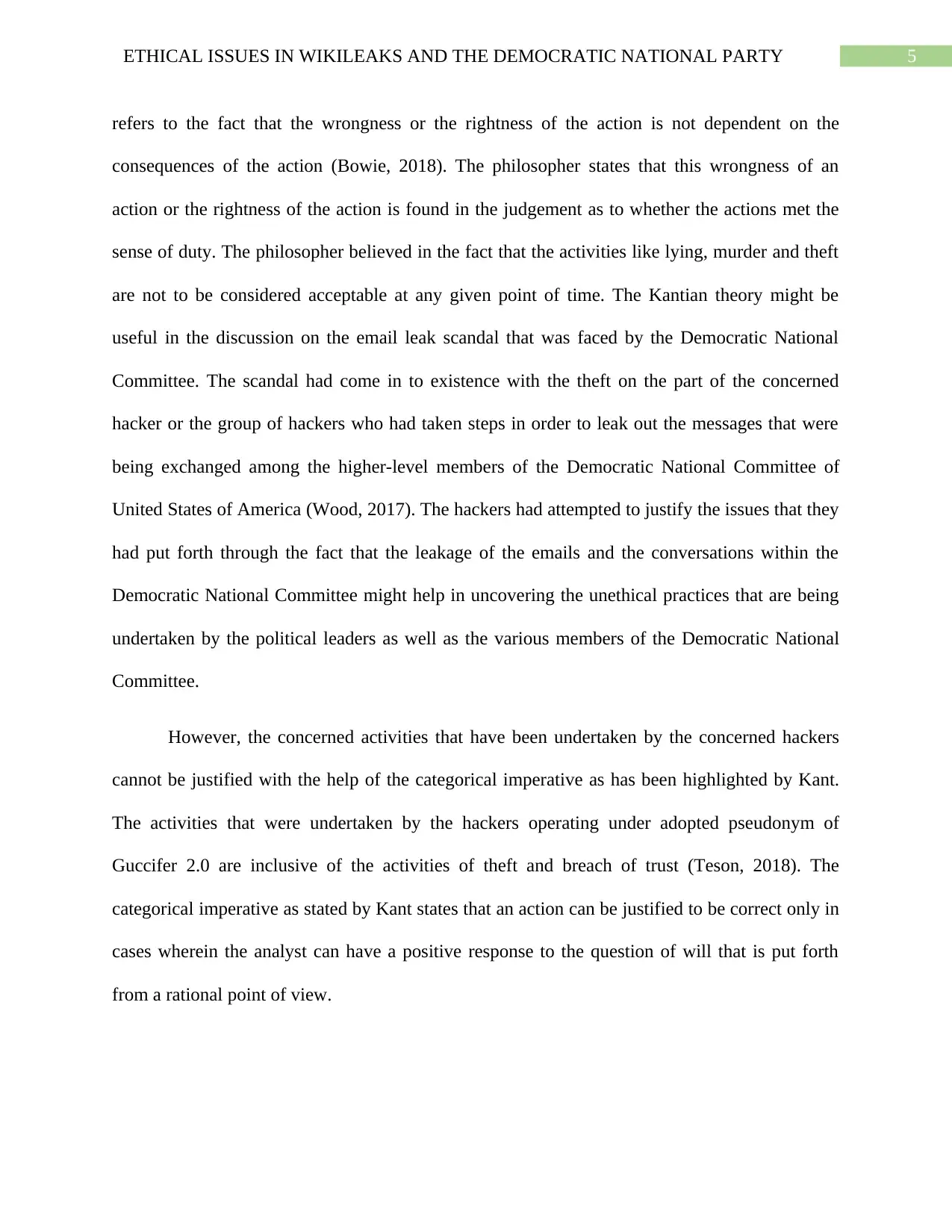
5ETHICAL ISSUES IN WIKILEAKS AND THE DEMOCRATIC NATIONAL PARTY
refers to the fact that the wrongness or the rightness of the action is not dependent on the
consequences of the action (Bowie, 2018). The philosopher states that this wrongness of an
action or the rightness of the action is found in the judgement as to whether the actions met the
sense of duty. The philosopher believed in the fact that the activities like lying, murder and theft
are not to be considered acceptable at any given point of time. The Kantian theory might be
useful in the discussion on the email leak scandal that was faced by the Democratic National
Committee. The scandal had come in to existence with the theft on the part of the concerned
hacker or the group of hackers who had taken steps in order to leak out the messages that were
being exchanged among the higher-level members of the Democratic National Committee of
United States of America (Wood, 2017). The hackers had attempted to justify the issues that they
had put forth through the fact that the leakage of the emails and the conversations within the
Democratic National Committee might help in uncovering the unethical practices that are being
undertaken by the political leaders as well as the various members of the Democratic National
Committee.
However, the concerned activities that have been undertaken by the concerned hackers
cannot be justified with the help of the categorical imperative as has been highlighted by Kant.
The activities that were undertaken by the hackers operating under adopted pseudonym of
Guccifer 2.0 are inclusive of the activities of theft and breach of trust (Teson, 2018). The
categorical imperative as stated by Kant states that an action can be justified to be correct only in
cases wherein the analyst can have a positive response to the question of will that is put forth
from a rational point of view.
refers to the fact that the wrongness or the rightness of the action is not dependent on the
consequences of the action (Bowie, 2018). The philosopher states that this wrongness of an
action or the rightness of the action is found in the judgement as to whether the actions met the
sense of duty. The philosopher believed in the fact that the activities like lying, murder and theft
are not to be considered acceptable at any given point of time. The Kantian theory might be
useful in the discussion on the email leak scandal that was faced by the Democratic National
Committee. The scandal had come in to existence with the theft on the part of the concerned
hacker or the group of hackers who had taken steps in order to leak out the messages that were
being exchanged among the higher-level members of the Democratic National Committee of
United States of America (Wood, 2017). The hackers had attempted to justify the issues that they
had put forth through the fact that the leakage of the emails and the conversations within the
Democratic National Committee might help in uncovering the unethical practices that are being
undertaken by the political leaders as well as the various members of the Democratic National
Committee.
However, the concerned activities that have been undertaken by the concerned hackers
cannot be justified with the help of the categorical imperative as has been highlighted by Kant.
The activities that were undertaken by the hackers operating under adopted pseudonym of
Guccifer 2.0 are inclusive of the activities of theft and breach of trust (Teson, 2018). The
categorical imperative as stated by Kant states that an action can be justified to be correct only in
cases wherein the analyst can have a positive response to the question of will that is put forth
from a rational point of view.
⊘ This is a preview!⊘
Do you want full access?
Subscribe today to unlock all pages.

Trusted by 1+ million students worldwide
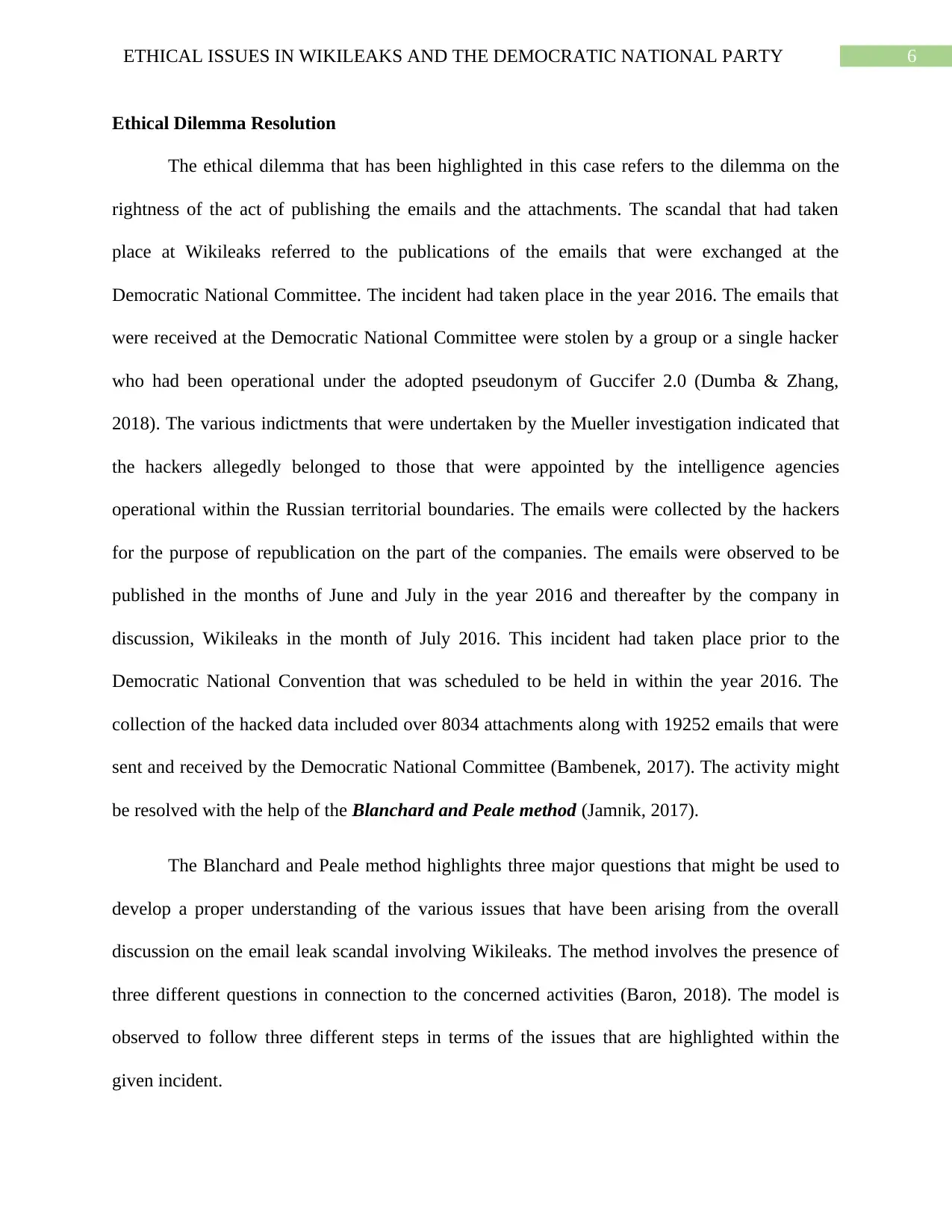
6ETHICAL ISSUES IN WIKILEAKS AND THE DEMOCRATIC NATIONAL PARTY
Ethical Dilemma Resolution
The ethical dilemma that has been highlighted in this case refers to the dilemma on the
rightness of the act of publishing the emails and the attachments. The scandal that had taken
place at Wikileaks referred to the publications of the emails that were exchanged at the
Democratic National Committee. The incident had taken place in the year 2016. The emails that
were received at the Democratic National Committee were stolen by a group or a single hacker
who had been operational under the adopted pseudonym of Guccifer 2.0 (Dumba & Zhang,
2018). The various indictments that were undertaken by the Mueller investigation indicated that
the hackers allegedly belonged to those that were appointed by the intelligence agencies
operational within the Russian territorial boundaries. The emails were collected by the hackers
for the purpose of republication on the part of the companies. The emails were observed to be
published in the months of June and July in the year 2016 and thereafter by the company in
discussion, Wikileaks in the month of July 2016. This incident had taken place prior to the
Democratic National Convention that was scheduled to be held in within the year 2016. The
collection of the hacked data included over 8034 attachments along with 19252 emails that were
sent and received by the Democratic National Committee (Bambenek, 2017). The activity might
be resolved with the help of the Blanchard and Peale method (Jamnik, 2017).
The Blanchard and Peale method highlights three major questions that might be used to
develop a proper understanding of the various issues that have been arising from the overall
discussion on the email leak scandal involving Wikileaks. The method involves the presence of
three different questions in connection to the concerned activities (Baron, 2018). The model is
observed to follow three different steps in terms of the issues that are highlighted within the
given incident.
Ethical Dilemma Resolution
The ethical dilemma that has been highlighted in this case refers to the dilemma on the
rightness of the act of publishing the emails and the attachments. The scandal that had taken
place at Wikileaks referred to the publications of the emails that were exchanged at the
Democratic National Committee. The incident had taken place in the year 2016. The emails that
were received at the Democratic National Committee were stolen by a group or a single hacker
who had been operational under the adopted pseudonym of Guccifer 2.0 (Dumba & Zhang,
2018). The various indictments that were undertaken by the Mueller investigation indicated that
the hackers allegedly belonged to those that were appointed by the intelligence agencies
operational within the Russian territorial boundaries. The emails were collected by the hackers
for the purpose of republication on the part of the companies. The emails were observed to be
published in the months of June and July in the year 2016 and thereafter by the company in
discussion, Wikileaks in the month of July 2016. This incident had taken place prior to the
Democratic National Convention that was scheduled to be held in within the year 2016. The
collection of the hacked data included over 8034 attachments along with 19252 emails that were
sent and received by the Democratic National Committee (Bambenek, 2017). The activity might
be resolved with the help of the Blanchard and Peale method (Jamnik, 2017).
The Blanchard and Peale method highlights three major questions that might be used to
develop a proper understanding of the various issues that have been arising from the overall
discussion on the email leak scandal involving Wikileaks. The method involves the presence of
three different questions in connection to the concerned activities (Baron, 2018). The model is
observed to follow three different steps in terms of the issues that are highlighted within the
given incident.
Paraphrase This Document
Need a fresh take? Get an instant paraphrase of this document with our AI Paraphraser
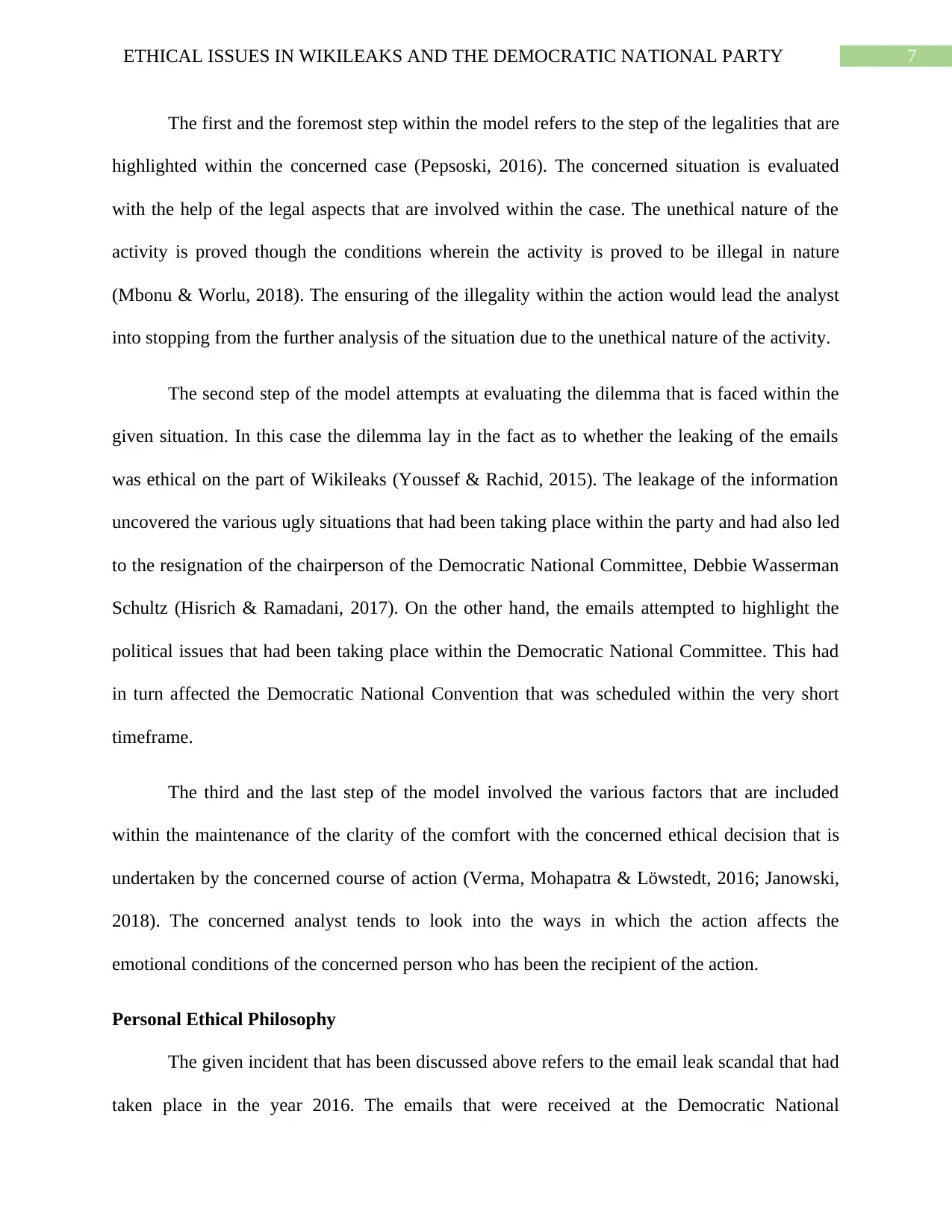
7ETHICAL ISSUES IN WIKILEAKS AND THE DEMOCRATIC NATIONAL PARTY
The first and the foremost step within the model refers to the step of the legalities that are
highlighted within the concerned case (Pepsoski, 2016). The concerned situation is evaluated
with the help of the legal aspects that are involved within the case. The unethical nature of the
activity is proved though the conditions wherein the activity is proved to be illegal in nature
(Mbonu & Worlu, 2018). The ensuring of the illegality within the action would lead the analyst
into stopping from the further analysis of the situation due to the unethical nature of the activity.
The second step of the model attempts at evaluating the dilemma that is faced within the
given situation. In this case the dilemma lay in the fact as to whether the leaking of the emails
was ethical on the part of Wikileaks (Youssef & Rachid, 2015). The leakage of the information
uncovered the various ugly situations that had been taking place within the party and had also led
to the resignation of the chairperson of the Democratic National Committee, Debbie Wasserman
Schultz (Hisrich & Ramadani, 2017). On the other hand, the emails attempted to highlight the
political issues that had been taking place within the Democratic National Committee. This had
in turn affected the Democratic National Convention that was scheduled within the very short
timeframe.
The third and the last step of the model involved the various factors that are included
within the maintenance of the clarity of the comfort with the concerned ethical decision that is
undertaken by the concerned course of action (Verma, Mohapatra & Löwstedt, 2016; Janowski,
2018). The concerned analyst tends to look into the ways in which the action affects the
emotional conditions of the concerned person who has been the recipient of the action.
Personal Ethical Philosophy
The given incident that has been discussed above refers to the email leak scandal that had
taken place in the year 2016. The emails that were received at the Democratic National
The first and the foremost step within the model refers to the step of the legalities that are
highlighted within the concerned case (Pepsoski, 2016). The concerned situation is evaluated
with the help of the legal aspects that are involved within the case. The unethical nature of the
activity is proved though the conditions wherein the activity is proved to be illegal in nature
(Mbonu & Worlu, 2018). The ensuring of the illegality within the action would lead the analyst
into stopping from the further analysis of the situation due to the unethical nature of the activity.
The second step of the model attempts at evaluating the dilemma that is faced within the
given situation. In this case the dilemma lay in the fact as to whether the leaking of the emails
was ethical on the part of Wikileaks (Youssef & Rachid, 2015). The leakage of the information
uncovered the various ugly situations that had been taking place within the party and had also led
to the resignation of the chairperson of the Democratic National Committee, Debbie Wasserman
Schultz (Hisrich & Ramadani, 2017). On the other hand, the emails attempted to highlight the
political issues that had been taking place within the Democratic National Committee. This had
in turn affected the Democratic National Convention that was scheduled within the very short
timeframe.
The third and the last step of the model involved the various factors that are included
within the maintenance of the clarity of the comfort with the concerned ethical decision that is
undertaken by the concerned course of action (Verma, Mohapatra & Löwstedt, 2016; Janowski,
2018). The concerned analyst tends to look into the ways in which the action affects the
emotional conditions of the concerned person who has been the recipient of the action.
Personal Ethical Philosophy
The given incident that has been discussed above refers to the email leak scandal that had
taken place in the year 2016. The emails that were received at the Democratic National
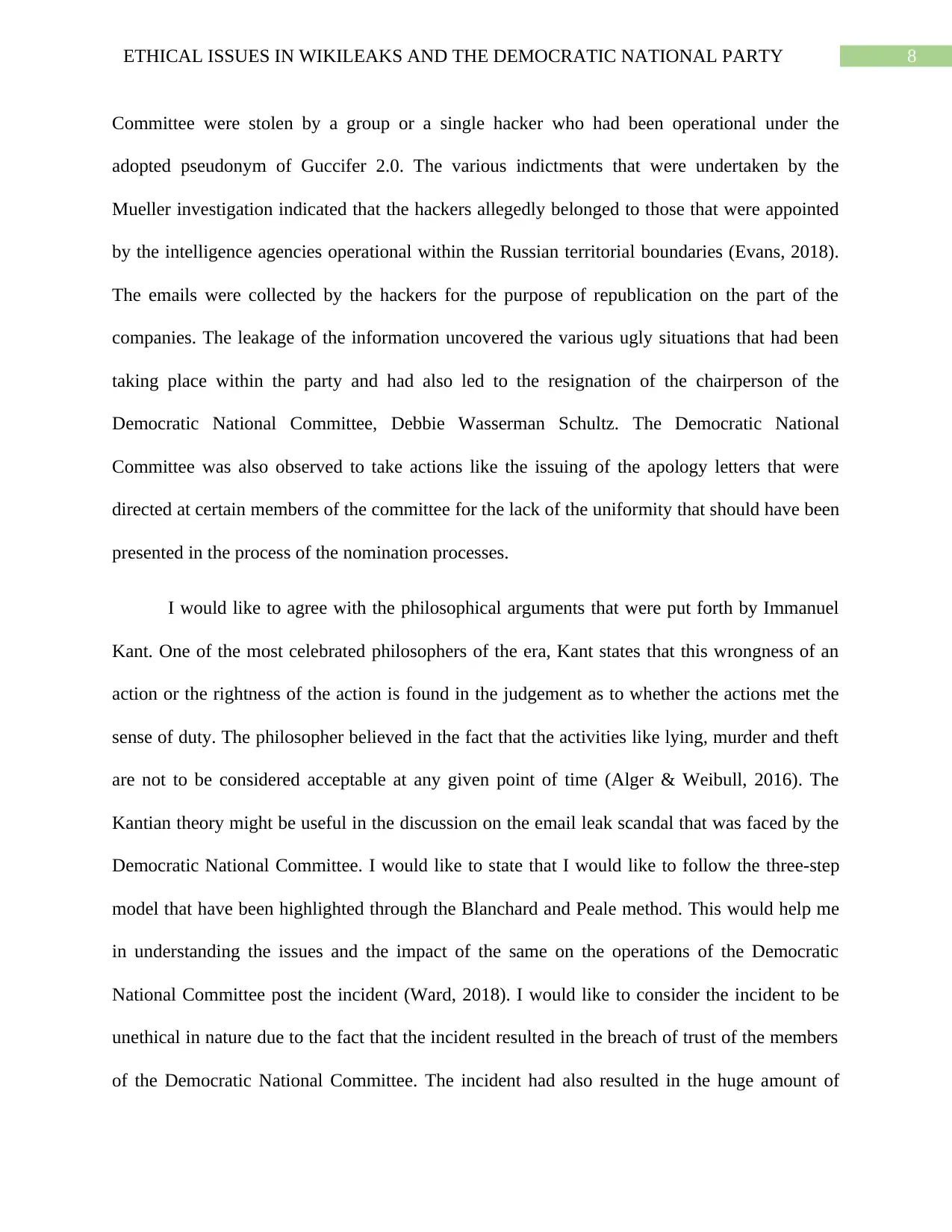
8ETHICAL ISSUES IN WIKILEAKS AND THE DEMOCRATIC NATIONAL PARTY
Committee were stolen by a group or a single hacker who had been operational under the
adopted pseudonym of Guccifer 2.0. The various indictments that were undertaken by the
Mueller investigation indicated that the hackers allegedly belonged to those that were appointed
by the intelligence agencies operational within the Russian territorial boundaries (Evans, 2018).
The emails were collected by the hackers for the purpose of republication on the part of the
companies. The leakage of the information uncovered the various ugly situations that had been
taking place within the party and had also led to the resignation of the chairperson of the
Democratic National Committee, Debbie Wasserman Schultz. The Democratic National
Committee was also observed to take actions like the issuing of the apology letters that were
directed at certain members of the committee for the lack of the uniformity that should have been
presented in the process of the nomination processes.
I would like to agree with the philosophical arguments that were put forth by Immanuel
Kant. One of the most celebrated philosophers of the era, Kant states that this wrongness of an
action or the rightness of the action is found in the judgement as to whether the actions met the
sense of duty. The philosopher believed in the fact that the activities like lying, murder and theft
are not to be considered acceptable at any given point of time (Alger & Weibull, 2016). The
Kantian theory might be useful in the discussion on the email leak scandal that was faced by the
Democratic National Committee. I would like to state that I would like to follow the three-step
model that have been highlighted through the Blanchard and Peale method. This would help me
in understanding the issues and the impact of the same on the operations of the Democratic
National Committee post the incident (Ward, 2018). I would like to consider the incident to be
unethical in nature due to the fact that the incident resulted in the breach of trust of the members
of the Democratic National Committee. The incident had also resulted in the huge amount of
Committee were stolen by a group or a single hacker who had been operational under the
adopted pseudonym of Guccifer 2.0. The various indictments that were undertaken by the
Mueller investigation indicated that the hackers allegedly belonged to those that were appointed
by the intelligence agencies operational within the Russian territorial boundaries (Evans, 2018).
The emails were collected by the hackers for the purpose of republication on the part of the
companies. The leakage of the information uncovered the various ugly situations that had been
taking place within the party and had also led to the resignation of the chairperson of the
Democratic National Committee, Debbie Wasserman Schultz. The Democratic National
Committee was also observed to take actions like the issuing of the apology letters that were
directed at certain members of the committee for the lack of the uniformity that should have been
presented in the process of the nomination processes.
I would like to agree with the philosophical arguments that were put forth by Immanuel
Kant. One of the most celebrated philosophers of the era, Kant states that this wrongness of an
action or the rightness of the action is found in the judgement as to whether the actions met the
sense of duty. The philosopher believed in the fact that the activities like lying, murder and theft
are not to be considered acceptable at any given point of time (Alger & Weibull, 2016). The
Kantian theory might be useful in the discussion on the email leak scandal that was faced by the
Democratic National Committee. I would like to state that I would like to follow the three-step
model that have been highlighted through the Blanchard and Peale method. This would help me
in understanding the issues and the impact of the same on the operations of the Democratic
National Committee post the incident (Ward, 2018). I would like to consider the incident to be
unethical in nature due to the fact that the incident resulted in the breach of trust of the members
of the Democratic National Committee. The incident had also resulted in the huge amount of
⊘ This is a preview!⊘
Do you want full access?
Subscribe today to unlock all pages.

Trusted by 1+ million students worldwide
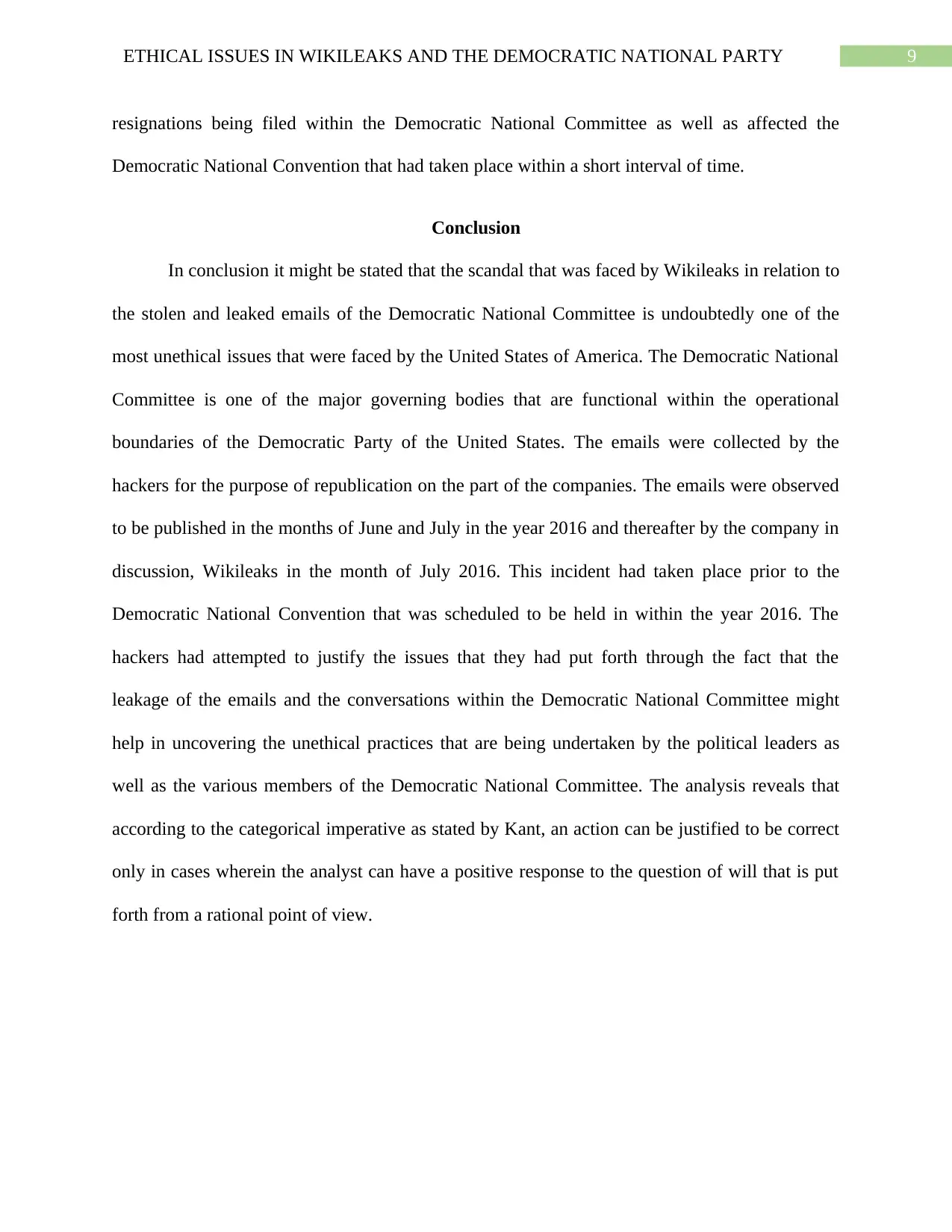
9ETHICAL ISSUES IN WIKILEAKS AND THE DEMOCRATIC NATIONAL PARTY
resignations being filed within the Democratic National Committee as well as affected the
Democratic National Convention that had taken place within a short interval of time.
Conclusion
In conclusion it might be stated that the scandal that was faced by Wikileaks in relation to
the stolen and leaked emails of the Democratic National Committee is undoubtedly one of the
most unethical issues that were faced by the United States of America. The Democratic National
Committee is one of the major governing bodies that are functional within the operational
boundaries of the Democratic Party of the United States. The emails were collected by the
hackers for the purpose of republication on the part of the companies. The emails were observed
to be published in the months of June and July in the year 2016 and thereafter by the company in
discussion, Wikileaks in the month of July 2016. This incident had taken place prior to the
Democratic National Convention that was scheduled to be held in within the year 2016. The
hackers had attempted to justify the issues that they had put forth through the fact that the
leakage of the emails and the conversations within the Democratic National Committee might
help in uncovering the unethical practices that are being undertaken by the political leaders as
well as the various members of the Democratic National Committee. The analysis reveals that
according to the categorical imperative as stated by Kant, an action can be justified to be correct
only in cases wherein the analyst can have a positive response to the question of will that is put
forth from a rational point of view.
resignations being filed within the Democratic National Committee as well as affected the
Democratic National Convention that had taken place within a short interval of time.
Conclusion
In conclusion it might be stated that the scandal that was faced by Wikileaks in relation to
the stolen and leaked emails of the Democratic National Committee is undoubtedly one of the
most unethical issues that were faced by the United States of America. The Democratic National
Committee is one of the major governing bodies that are functional within the operational
boundaries of the Democratic Party of the United States. The emails were collected by the
hackers for the purpose of republication on the part of the companies. The emails were observed
to be published in the months of June and July in the year 2016 and thereafter by the company in
discussion, Wikileaks in the month of July 2016. This incident had taken place prior to the
Democratic National Convention that was scheduled to be held in within the year 2016. The
hackers had attempted to justify the issues that they had put forth through the fact that the
leakage of the emails and the conversations within the Democratic National Committee might
help in uncovering the unethical practices that are being undertaken by the political leaders as
well as the various members of the Democratic National Committee. The analysis reveals that
according to the categorical imperative as stated by Kant, an action can be justified to be correct
only in cases wherein the analyst can have a positive response to the question of will that is put
forth from a rational point of view.
Paraphrase This Document
Need a fresh take? Get an instant paraphrase of this document with our AI Paraphraser
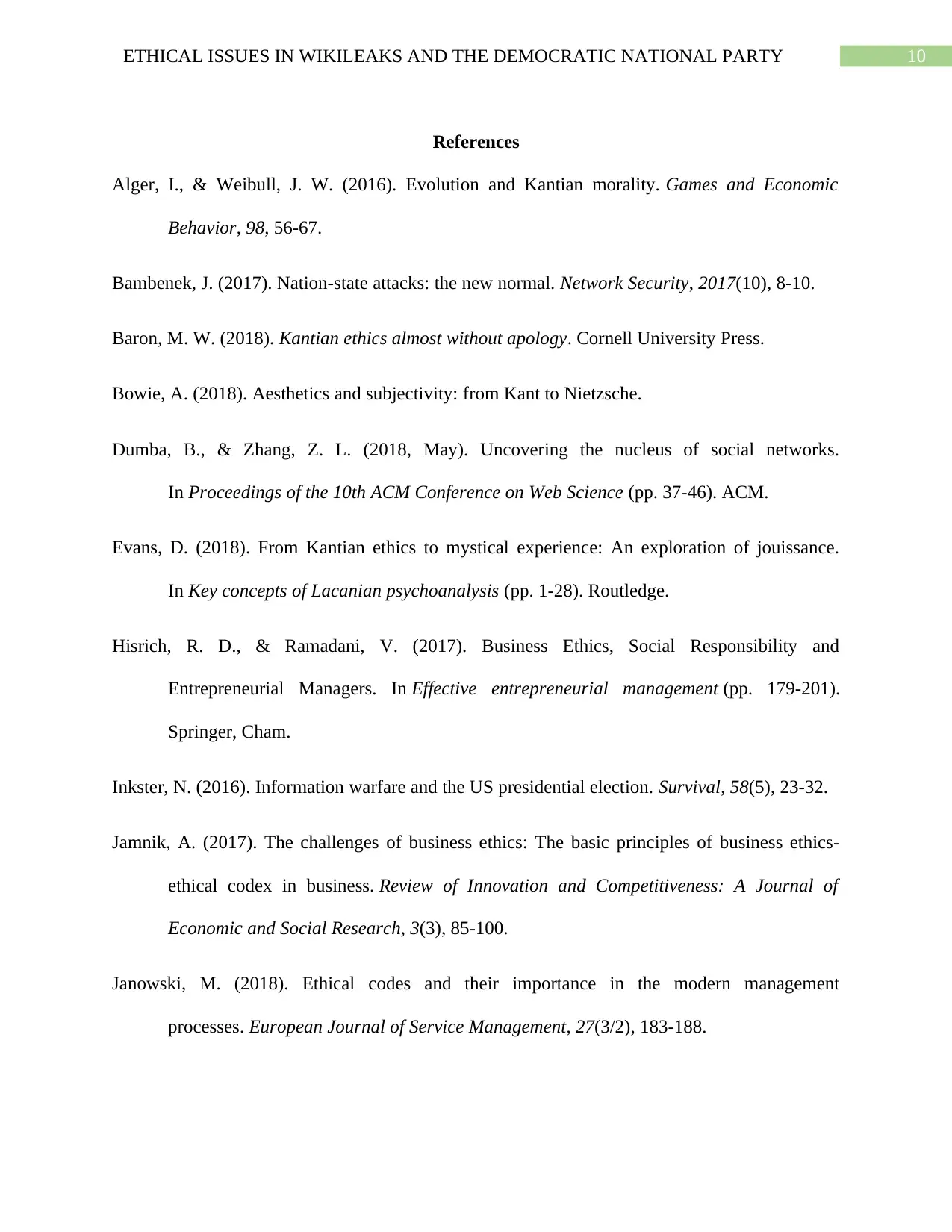
10ETHICAL ISSUES IN WIKILEAKS AND THE DEMOCRATIC NATIONAL PARTY
References
Alger, I., & Weibull, J. W. (2016). Evolution and Kantian morality. Games and Economic
Behavior, 98, 56-67.
Bambenek, J. (2017). Nation-state attacks: the new normal. Network Security, 2017(10), 8-10.
Baron, M. W. (2018). Kantian ethics almost without apology. Cornell University Press.
Bowie, A. (2018). Aesthetics and subjectivity: from Kant to Nietzsche.
Dumba, B., & Zhang, Z. L. (2018, May). Uncovering the nucleus of social networks.
In Proceedings of the 10th ACM Conference on Web Science (pp. 37-46). ACM.
Evans, D. (2018). From Kantian ethics to mystical experience: An exploration of jouissance.
In Key concepts of Lacanian psychoanalysis (pp. 1-28). Routledge.
Hisrich, R. D., & Ramadani, V. (2017). Business Ethics, Social Responsibility and
Entrepreneurial Managers. In Effective entrepreneurial management (pp. 179-201).
Springer, Cham.
Inkster, N. (2016). Information warfare and the US presidential election. Survival, 58(5), 23-32.
Jamnik, A. (2017). The challenges of business ethics: The basic principles of business ethics-
ethical codex in business. Review of Innovation and Competitiveness: A Journal of
Economic and Social Research, 3(3), 85-100.
Janowski, M. (2018). Ethical codes and their importance in the modern management
processes. European Journal of Service Management, 27(3/2), 183-188.
References
Alger, I., & Weibull, J. W. (2016). Evolution and Kantian morality. Games and Economic
Behavior, 98, 56-67.
Bambenek, J. (2017). Nation-state attacks: the new normal. Network Security, 2017(10), 8-10.
Baron, M. W. (2018). Kantian ethics almost without apology. Cornell University Press.
Bowie, A. (2018). Aesthetics and subjectivity: from Kant to Nietzsche.
Dumba, B., & Zhang, Z. L. (2018, May). Uncovering the nucleus of social networks.
In Proceedings of the 10th ACM Conference on Web Science (pp. 37-46). ACM.
Evans, D. (2018). From Kantian ethics to mystical experience: An exploration of jouissance.
In Key concepts of Lacanian psychoanalysis (pp. 1-28). Routledge.
Hisrich, R. D., & Ramadani, V. (2017). Business Ethics, Social Responsibility and
Entrepreneurial Managers. In Effective entrepreneurial management (pp. 179-201).
Springer, Cham.
Inkster, N. (2016). Information warfare and the US presidential election. Survival, 58(5), 23-32.
Jamnik, A. (2017). The challenges of business ethics: The basic principles of business ethics-
ethical codex in business. Review of Innovation and Competitiveness: A Journal of
Economic and Social Research, 3(3), 85-100.
Janowski, M. (2018). Ethical codes and their importance in the modern management
processes. European Journal of Service Management, 27(3/2), 183-188.
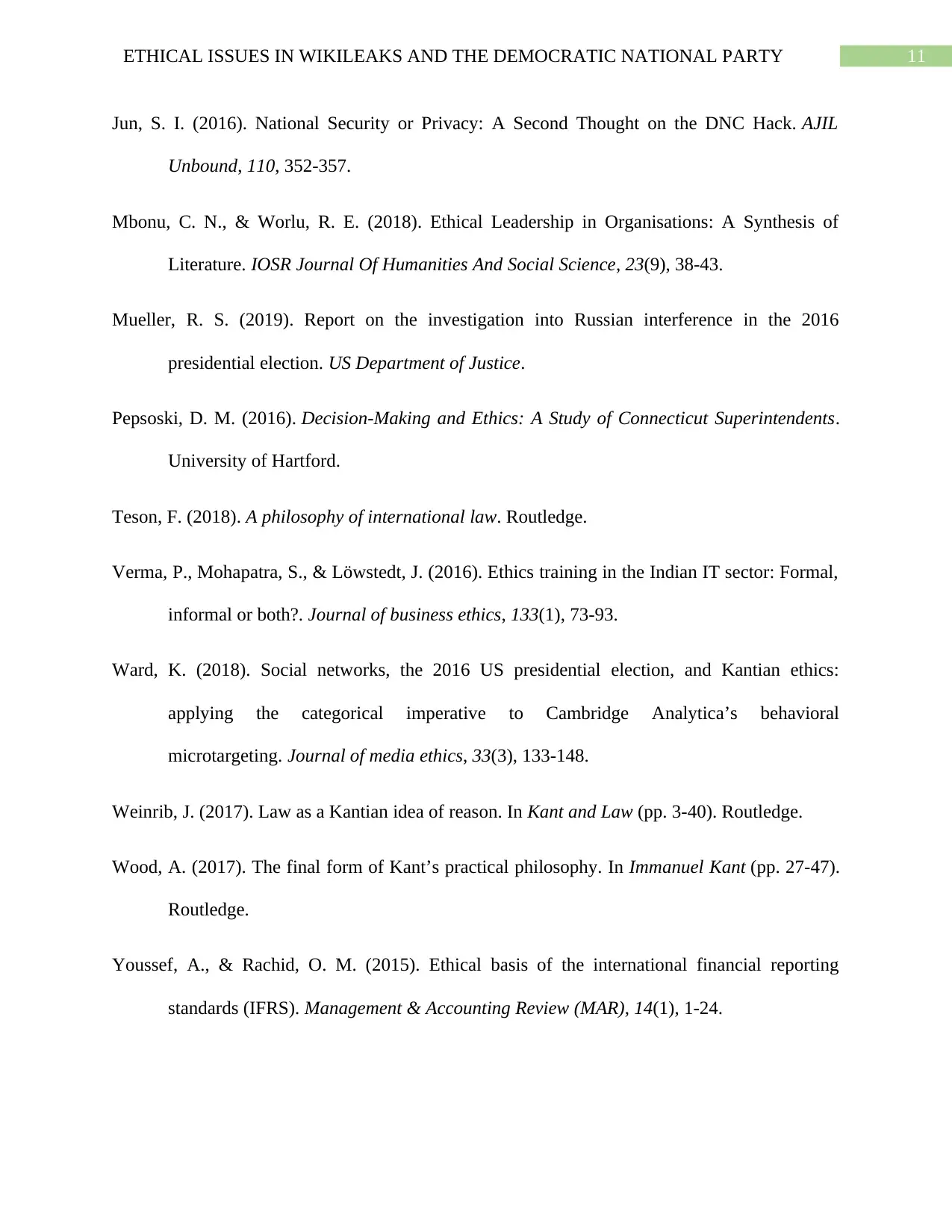
11ETHICAL ISSUES IN WIKILEAKS AND THE DEMOCRATIC NATIONAL PARTY
Jun, S. I. (2016). National Security or Privacy: A Second Thought on the DNC Hack. AJIL
Unbound, 110, 352-357.
Mbonu, C. N., & Worlu, R. E. (2018). Ethical Leadership in Organisations: A Synthesis of
Literature. IOSR Journal Of Humanities And Social Science, 23(9), 38-43.
Mueller, R. S. (2019). Report on the investigation into Russian interference in the 2016
presidential election. US Department of Justice.
Pepsoski, D. M. (2016). Decision-Making and Ethics: A Study of Connecticut Superintendents.
University of Hartford.
Teson, F. (2018). A philosophy of international law. Routledge.
Verma, P., Mohapatra, S., & Löwstedt, J. (2016). Ethics training in the Indian IT sector: Formal,
informal or both?. Journal of business ethics, 133(1), 73-93.
Ward, K. (2018). Social networks, the 2016 US presidential election, and Kantian ethics:
applying the categorical imperative to Cambridge Analytica’s behavioral
microtargeting. Journal of media ethics, 33(3), 133-148.
Weinrib, J. (2017). Law as a Kantian idea of reason. In Kant and Law (pp. 3-40). Routledge.
Wood, A. (2017). The final form of Kant’s practical philosophy. In Immanuel Kant (pp. 27-47).
Routledge.
Youssef, A., & Rachid, O. M. (2015). Ethical basis of the international financial reporting
standards (IFRS). Management & Accounting Review (MAR), 14(1), 1-24.
Jun, S. I. (2016). National Security or Privacy: A Second Thought on the DNC Hack. AJIL
Unbound, 110, 352-357.
Mbonu, C. N., & Worlu, R. E. (2018). Ethical Leadership in Organisations: A Synthesis of
Literature. IOSR Journal Of Humanities And Social Science, 23(9), 38-43.
Mueller, R. S. (2019). Report on the investigation into Russian interference in the 2016
presidential election. US Department of Justice.
Pepsoski, D. M. (2016). Decision-Making and Ethics: A Study of Connecticut Superintendents.
University of Hartford.
Teson, F. (2018). A philosophy of international law. Routledge.
Verma, P., Mohapatra, S., & Löwstedt, J. (2016). Ethics training in the Indian IT sector: Formal,
informal or both?. Journal of business ethics, 133(1), 73-93.
Ward, K. (2018). Social networks, the 2016 US presidential election, and Kantian ethics:
applying the categorical imperative to Cambridge Analytica’s behavioral
microtargeting. Journal of media ethics, 33(3), 133-148.
Weinrib, J. (2017). Law as a Kantian idea of reason. In Kant and Law (pp. 3-40). Routledge.
Wood, A. (2017). The final form of Kant’s practical philosophy. In Immanuel Kant (pp. 27-47).
Routledge.
Youssef, A., & Rachid, O. M. (2015). Ethical basis of the international financial reporting
standards (IFRS). Management & Accounting Review (MAR), 14(1), 1-24.
⊘ This is a preview!⊘
Do you want full access?
Subscribe today to unlock all pages.

Trusted by 1+ million students worldwide
1 out of 12
Related Documents
Your All-in-One AI-Powered Toolkit for Academic Success.
+13062052269
info@desklib.com
Available 24*7 on WhatsApp / Email
![[object Object]](/_next/static/media/star-bottom.7253800d.svg)
Unlock your academic potential
Copyright © 2020–2026 A2Z Services. All Rights Reserved. Developed and managed by ZUCOL.



